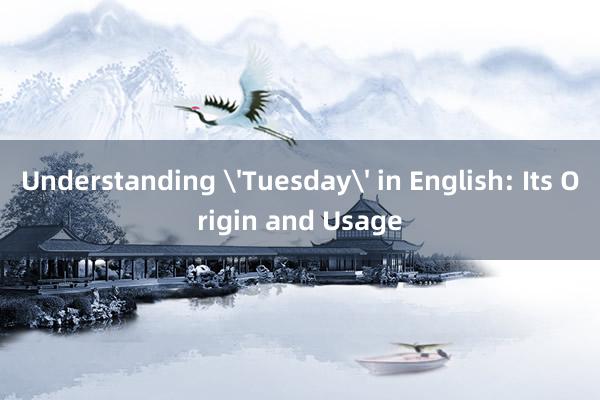时间:2024-09-13 07:39

### Understanding 'Tuesday' in English: Its Origin and Usage
In the vast tapestry of the English language, each word carries a unique history and meaning. Among these words, "Tuesday" stands out not only for its historical significance but also for its intriguing etymology and varied usage. This article delves into the origins and uses of "Tuesday," offering insights into how this day of the week has been integrated into the English language and culture.
#### **Origins of Tuesday**
The term "Tuesday" has a rich etymological background, tracing back to ancient Germanic languages. It is derived from the Old English "tīwesdæg," which means "Tiw's day." The name Tiw refers to the god Tiwaz, one of the most important gods in Norse mythology, associated with battle and victory. In Anglo-Saxon times, Tiw was identified with the Roman god Mars, the god of war, reflecting the influence of Roman culture on the Anglo-Saxons.
#### **Evolution of Tuesday**
Over time, as languages evolved and cultures interacted, the name "Tuesday" underwent various changes. In Middle English,首页-湖茂艾颜料有限公司 it was written as "Tuesdaie, 宿迁泵阀制造网-泵阀网,水泵,阀门,泵阀" while in Old English, it was "Tiwesdæg." The modern spelling of "Tuesday" reflects the influence of French and Latin, where the day was referred to as "Dieu jeudi" or "Jupiter's day," indicating the Roman god Jupiter, who was also associated with thunder and sky.
#### **Usage of Tuesday**
宁波百辉日用品有限公司In contemporary English,徐州国宏包装有限公司 "Tuesday" is primarily used as a day name within the week, following Monday and preceding Wednesday. It is often abbreviated as "Tue." in formal contexts such as calendars, schedules, and official documents. Beyond its literal use, "Tuesday" can also be used metaphorically or idiomatically. For instance, expressions like "It's a long way to Tuesday" suggest that a distant event is far off or that something is taking a considerable amount of time.
#### **Cultural Significance**
In English-speaking cultures, "Tuesday" is not just a day of the week; it often carries connotations related to the god it is named after, Tiw/Mars. Historically, Tuesdays were sometimes considered lucky days, especially for matters involving strength or courage. In modern times, however, the significance of "Tuesday" is more practical than religious, serving as a key element in organizing schedules and planning activities.
#### **Conclusion**
Understanding "Tuesday" goes beyond recognizing its day name; it involves appreciating its historical roots, linguistic evolution, and cultural implications. From its origin in Norse mythology to its current role in organizing daily life, "Tuesday" stands as a testament to the dynamic nature of language and its ability to reflect and shape cultural narratives. Whether through its direct use in calendars or its metaphorical applications in everyday speech, "Tuesday" remains a fascinating aspect of the English language徐州国宏包装有限公司, embodying both its historical depth and its relevance in modern times.